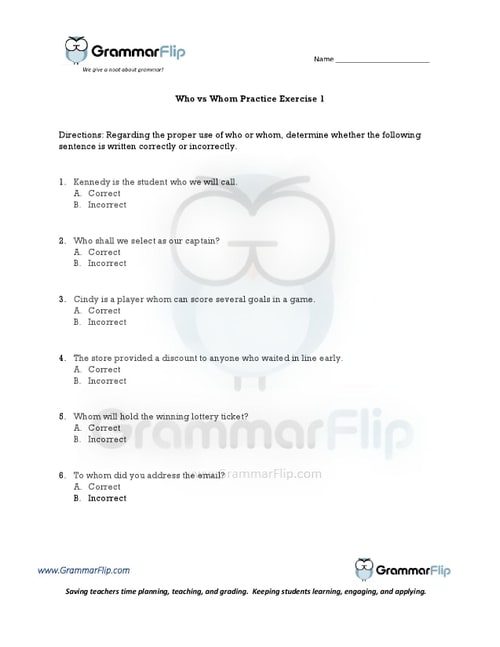When Should I Use Who vs. Whom?
Who and whom are commonly confused, but ‘who’ is used to refer to the subject of a sentence, while ‘whom’ is used to refer to an object.
Some examples of when to use who vs. whom would be the following:
Elizabeth is the only student who got a perfect score on the exam.
– “Who” is the subject of the verb “got.”
Who will be filling in for Mr. Bingham today?
– “Who” is the subject of the verb phrase “will be filling.”
Anyone who buys five ice cream cones gets a sixth cone for free!
– “Who” is the subject of the verb “buys.”
To whom should I deliver this letter?
– “Whom” is the object of the preposition “to.”
Is Nestor the boy with whom you walk home from the bus stop?
– “Whom” is the object of the preposition “with.”
Long-Form Video: Who vs. Whom
Long-form instructional video lessons allow students to engage with grammar concepts in more depth and detail.
This format provides students with a stronger foundation and a more comprehensive understanding of when to use who vs. whom.
When You Should Use Who vs. Whom in Your Writing
One trick you can use to determine when to use “who” and when to use “whom” is the following:
If you can replace the “who/whom” word in the sentence with “he” or “she,” then use the word “who.” For example:
Who is at the door?
Correct: He is at the door.
Incorrect: Him is at the door.
If you can replace the “who/whom” word in the sentence with “him” or “her,” then use the word “whom.” For example:
Whom did you see at the door?
Rephrase it first: You did see whom at the door.
Correct: You did see her at the door.
Incorrect: You did see she at the door.
Download a Free Worksheet on Who vs. Whom!
Click the image below to download your free worksheet on who vs. whom!

Need a grammar program that provides the instruction and grading for you?
Explore More GrammarFlip Lessons!
Parts of Speech lessons provide the building blocks of grammar. GrammarFlip covers these topics in detail to ensure a solid foundation is built. First time learners and students seeking to review the parts of speech can both benefit from the instructional videos and slide show reviews.
Parts of the Sentence lessons are critical for understanding how the parts of speech function in language construction. From the basic to the advanced, these lessons will cover a wide range of grammar topics that can be used in any grade level or classroom.
Mechanics and Usage lessons equip students with the necessary skills to communicate clearly to all audiences. With a focus on the application of these concepts in student writing, these lessons tie together both simple constructions of grammar as well as the more complex such that any age or skill level of student will benefit.

